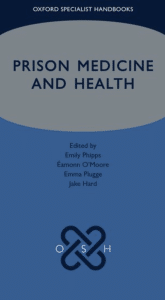
Carolyn Chew-Graham is Professor of General Practice Research at Keele University
and a general practitioner in Manchester
A pocket-sized book, it begins with “Language matters”, and a table outlining terms we should avoid and suggests less pejorative language to use. It is intended to fill a gap for health and social care practitioners working in prisons, and cites current evidence to back up much of the narrative and recommendations – but I wonder if it tries to do too much?
The sections on the legal aspects of prison care, custody, sentencing are all very valuable, and it is good to see a section on promoting wellbeing in prison.
Being pocket-sized means the font is small and may be difficult to read for many practitioners. I am puzzled by the inclusion of pictures of chicken-pox rash, how to take samples of vesicles, the figures on COVID-19 and ‘chain of survival’. I don’t think they add anything.
 Whilst the section on language and terminology is excellent, the authors haven’t followed this through in the book. The authors caution against using the term personality disorder but use this as title for section heading (page 188) in the chapter on mental health.
Whilst the section on language and terminology is excellent, the authors haven’t followed this through in the book. The authors caution against using the term personality disorder but use this as title for section heading (page 188) in the chapter on mental health.
The chapters on mental health (MH) and chronic disease management (CDM) are disappointing. Chapter 6 endeavours to cover many aspects of CDM but is confusing in focusing sometimes on ‘symptoms’ (eg chest pain), or diseases (eg Type 1 diabetes). This chapter does not cover long-term conditions (LTCs) in sufficient detail to give practitioners confidence in managing people with these LTCs and should not pretend to do so. Similarly, the chapter on mental health seemed too brief. There was no discussion of anxiety (often comorbid with depression). The authors used the term ‘moderate to severe depression’, which is not used in NICE Depression (update; NG 222) – the favoured term is ‘more severe depression’. The section on self-harm and suicide states that there is no evidence for the use of risk assessment tools in predicting suicide,1 but go on to include the C-SRRS, which may lead readers to use this. There is no discussion of the physical health in people with severe mental illness (SMI), problems which contribute to the 15-20 year mortality gap in people with SMI.2
There was little discussion of planning for release and the challenges for people moving to primary care and the challenges for general practices to conduct consultations with people recently released from prison, without sufficient information about problems and medication. This, for me, would have been a useful addition.
So, overall, this is a useful little book for students and practitioners early in their careers, but does not provide comprehensive coverage of clinical topics – particularly mental and physical health problems and this limitation should be included, with sign-posting to more detailed texts and guidelines.
Featured book: Phipps E, O’Moore É, Plugge E, and Hard J, Oxford specialist handbooks: Prison Medicine and Health, 2023, ISBN 9780198834533, Paperback, 416 pages £36.99
References:
1. Taylor AK, Steeg S, Quinlivan L, Gunnell L, Hawton K, Kapur N. Predictive accuracy of individual and combined risk scale items: multi-centre prospective cohort study. BJPsych Open. 2020. Vol 7, Issue 1. https://doi.org/10.1192/bjo.2020.123
2. Perry B, Mitchell C, Shiers D, Holt R, Chew-Graham CA. Lester positive metabolic resource update: improving cardiometabolic outcomes in people with severe mental illness. BJGP Nov 2023. https://doi.org/10.3399/bjgp23X735273
Conflict of interest: Dr Jake Hard and I are co-investigators on an NIHR RfPB study (NIHR: 342813).






